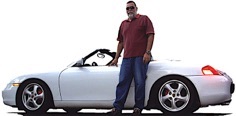Clunk!
Published in the November 2022 issue of “Die Porsche Kassette”
For more information on Porsche racing and more, please visit my website: www PedrosGarage.com.
Happy Porsche'ing,
Ⓒ2022 Technolab / PedrosGarage.com

A clunk is very different from a tick, which has noting to do with a hiss, a click, a squeal, a knock, a pop a rattle or a bang.
All of the above are sounds that you don't want to hear coming from your beloved Porsche.
But if you do, we'll try to steer you in the right direction.
There are hundreds of different sounds a car can make. Some good, others not so much.
Also, please keep in mind that a bad component may make more than one sound, and what I describe as a clunk, you may think it's a knock.
It'll be difficult trying to verbally describe the sounds, but here we go….
Clunk:
That's the most common one and usually comes from the front end.
If it happens when driving on bad roads it's usually a ball joint that's worn.
Ball joints have a flexible dust boot to protect the joint. When the boot tears it can allow grease to escape and road grime to come in doing damage to the joint.
Usually the drop links are the first to go, but control arms, trailing arms, steering arms, etc., all have ball joints that wear out with time and mileage.
If it happens when driving over bumps, it could be an issue with the suspension, such as a bad upper strut mount or even a bad strut itself (it happened to me recently).
If it happens when you're turning a corner, it could be a problem with the steering rack, or a worn out wheel bearing.
Squeak:
I mention squeaking here because many times it's a precursor to clunking. If your car starts squeaking when the suspension is depressed, it may be one or more of the ball joints that has dried out and is letting you know. If you determine which one it is check the condition of its dust boot. If intact, you can try to inject some lubricant (high quality lithium grease) into the boot with a syringe or with an aerosol straw tube. If it quiets down you know it need replacement soon.
Tick-Tick-Tick:
So many things can tick!
Generally ticking sounds are heard coming from the engine itself.
First check if the ticking varies with engine speed or car speed. That'll tell you if it's coming from the engine as you rev it with the clutch in or if it's from the drivetrain as you accelerate.
The fuel injectors (all 6 of them) can tick quite loudly.
The lifters, especially if the oil level is low can tick-tick-tic.
A shredding poly-ribbed belt can tick as it goes around.
Believe it or not, a very loud, metallic sounding tick an also be caused by a loose sparkplug.
If you can get the car on a lift, with the engine running, try to determine the general area where the ticking is coming from. The best listening device I use is a long screwdriver. Place the butt end against your ear and touch with the tip where you want to listen. You'll be surprised hat a great stethoscope it is.
Knock-knock:
If you can hear knocking sounds from your engine, get it checked out ASAP, something could be seriously wrong. A knowledgeable technician can tell you if it's serious or can be easily fixed.
What's generally called engine knocking really sounds more like clattering and is generally due to using a lower gasoline octane rating than what's recommended.
On high compression engines,
you need to use high octane to
avoid pre-ignition and knocking
which can damage the engine.
Fortunately most modern Porsches have automatic knock sensors that will retard timing to avoid pre-ignition (but you will lose power).
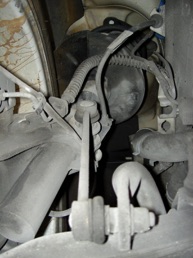
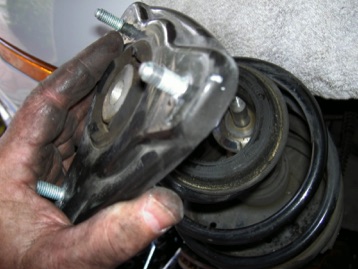
Worn Upper Strut Mount
Droplink
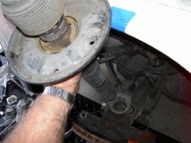
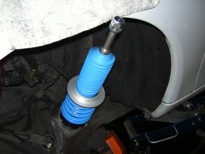
New Strut going in
Old Strut coming out
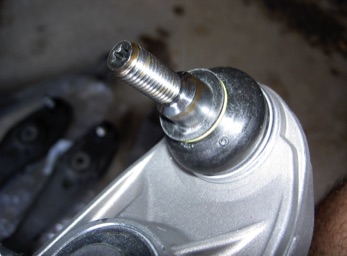
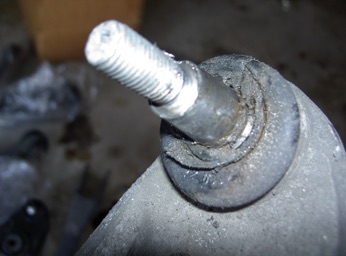
Torn boot on old ball joint
New arm and joint

Bang!, Pop!:
A loud bang, like a gunshot, is usually a backfire. Backfiring happens when unburnt fuel comes out of the engine and gets ignited in the exhaust pipe. This could be due to a vacuum or exhaust leak or a problem with one of the catalytic converters.
The bang can also happen in the intake at the throttle body and could indicate an issue with the fuel and or the ignition system, caused by a blocked fuel filter bad spark plugs or damaged cat.
If you hear grinding while applying the brakes, your brake pads are probably worn or you may have some debris caught between a disc and its pad.

Grinding or whirring:
If the grinding happens when shifting, you probably have an issue with a synchro in the transmission which makes your gears not mesh at a synchronized speed and therefore grind.
A dried-out CV Joint (drive axle) or a failing wheel bearing can also grind quite loudly.
Torn boot on CV Joint
Hissing:
A vacuum leak while accelerating makes a loud hiss.
A fluid leak getting onto a hot engine surface and also hiss.
Rattling:
Rattles under the car means that something is loose and making noise as it vibrates. Generally a heat shield in place over the catalytic converters is one of the most common culprits. They are mounted with hardware that deteriorates in time and allow them to vibrate and create rattling.
Whistle (Coke bottle whistle):
A very distinct and loud “coke bottle” whistle is most likely the air-oil separator (AOS). If the inside membrane tears, it can create this unique sound.
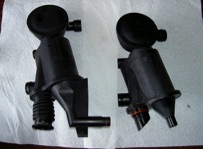
AOS (two versions)
Roar:
Most of our cars produce a beautiful roar as we accelerate (some call it the symphony in flat-6) but if your exhaust note changes all of the sudden to a loud roar, something happened to the exhaust system. The exhaust manifold may have cracked or one of the gaskets is allowing exhaust to freely escape. The muffler may be damaged or an exhaust pipe clamp could have rusted out and become loose.
Squeal:
A loud squeal when you rev the engine, especially when cold, is one of the easiest to diagnose. The belt is most likely loose and slipping on the pulley. It could be worn and in need of replacement, or the tensioner pulley may have lost its tension.
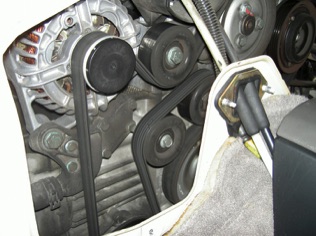
Serpentine Belt
If the squeal is coming from the wheels without using the brakes, you probably have some debris between the disc and the backing plate. If it happens when applying the brakes, then your brake pads may be worn out….
… and, if it's coming from your tires, back off the gas pedal!
